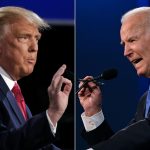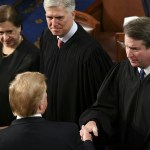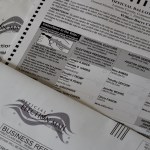Prime
 Where Things Stand: You Won’t Miss A Thing
Where Things Stand: You Won’t Miss A Thing 
We’re less than a week out from Election Day and today we’re launching a daily liveblog to keep you updated on all the latest election-related news — everything from shifting polls, campaign rally flubs, early voting numbers, voter intimidation and everything in between.

How we make sense of probabilities in math and science is one thing. But as humans we can never separate probabilities from stakes. If the consequences of one outcome are sufficiently dire that factors inevitably into our experience of the question, even bleeding into our perception of the chances of that dark outcome occurring. Here I’ve noticed a subtle shift in recent days in people’s discussions about the outcome of next week’s election. It seems to have shifted from ‘Who’s going to win?’ or ‘Who’s likely to win?’ to ‘Can Trump still win?’
The answer to that last questions is clearly “Yes”. But the question itself is an important shift driven by the fact that in likelihood terms the evidence is now pointing overwhelmingly against the President.
 See the Corrupt Court for What It Is
See the Corrupt Court for What It Is 
If you needed to know anything more about Amy Coney Barrett – I didn’t, but if you did – she made her first act last night appearing at a splashy campaign event for President Trump. Once the Senate voted to confirm her on a party line vote, she had a lifetime appointment and literally no need for anything from President Trump. Indeed, she would quite likely have marginally improved the odds that the corrupt conservative Court majority would remain in place by declining such an appearance.
She did it anyway and that was a choice.
 Where Things Stand: All The Indication We Needed
Where Things Stand: All The Indication We Needed 
The news out of the Supreme Court and the Senate last night fans flames of uncertainty about what might happen if the outcome of the election is disputed in the days after November 3.
 PA GOP Makes Another Go At SCOTUS To Reinstate Stricter Mail Ballot Deadlines
PA GOP Makes Another Go At SCOTUS To Reinstate Stricter Mail Ballot Deadlines 
 Where Things Stand: All But Certain
Where Things Stand: All But Certain 
Vice President Mike Pence won’t be around for tonight’s confirmation vote in the Senate. Republicans are clearly unconcerned that they will need him to break any sort of tie.
 Facebook Generates Extremism for Society and Profits for Investors
Facebook Generates Extremism for Society and Profits for Investors 
We’re all in the final stretch of the big contest. But I wanted to flag your attention to a column in the Post about some new peer-reviewed research about Facebook and its effect on political polarization. Unsurprisingly the more time someone spends on Facebook the more polarized their beliefs become. But it’s five times more polarizing for conservatives than for liberals. And that’s not the most telling data.
 Where Things Stand: Trump Reignites War On Civil Servants
Where Things Stand: Trump Reignites War On Civil Servants 
President Trump has had an issue with career professionals since he took office.


